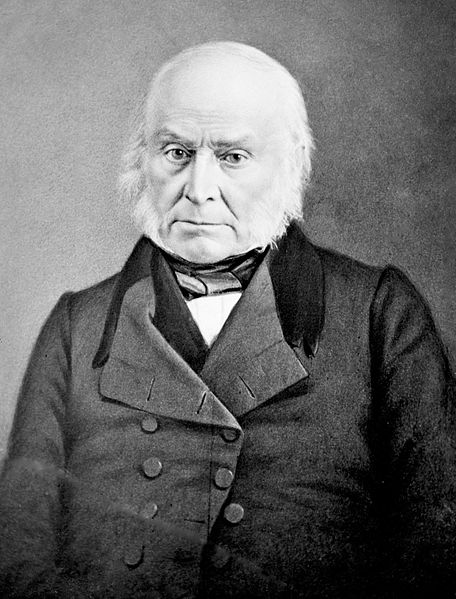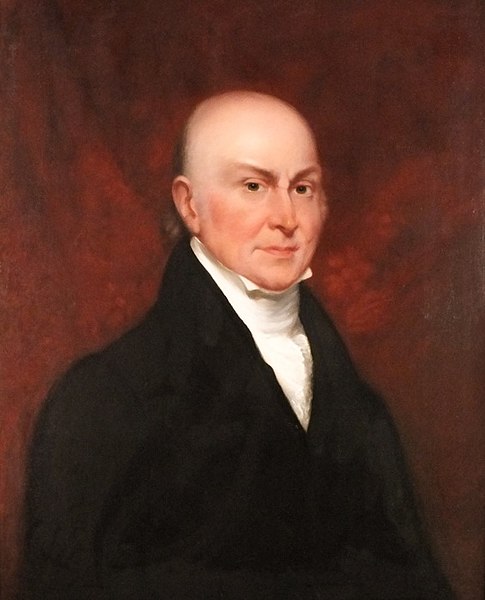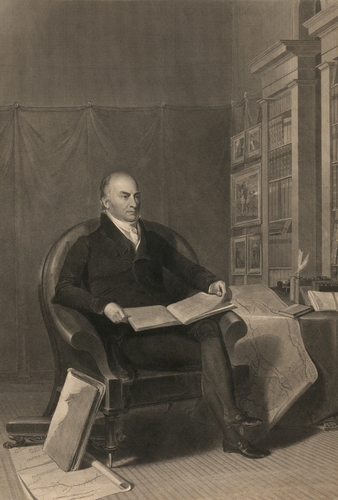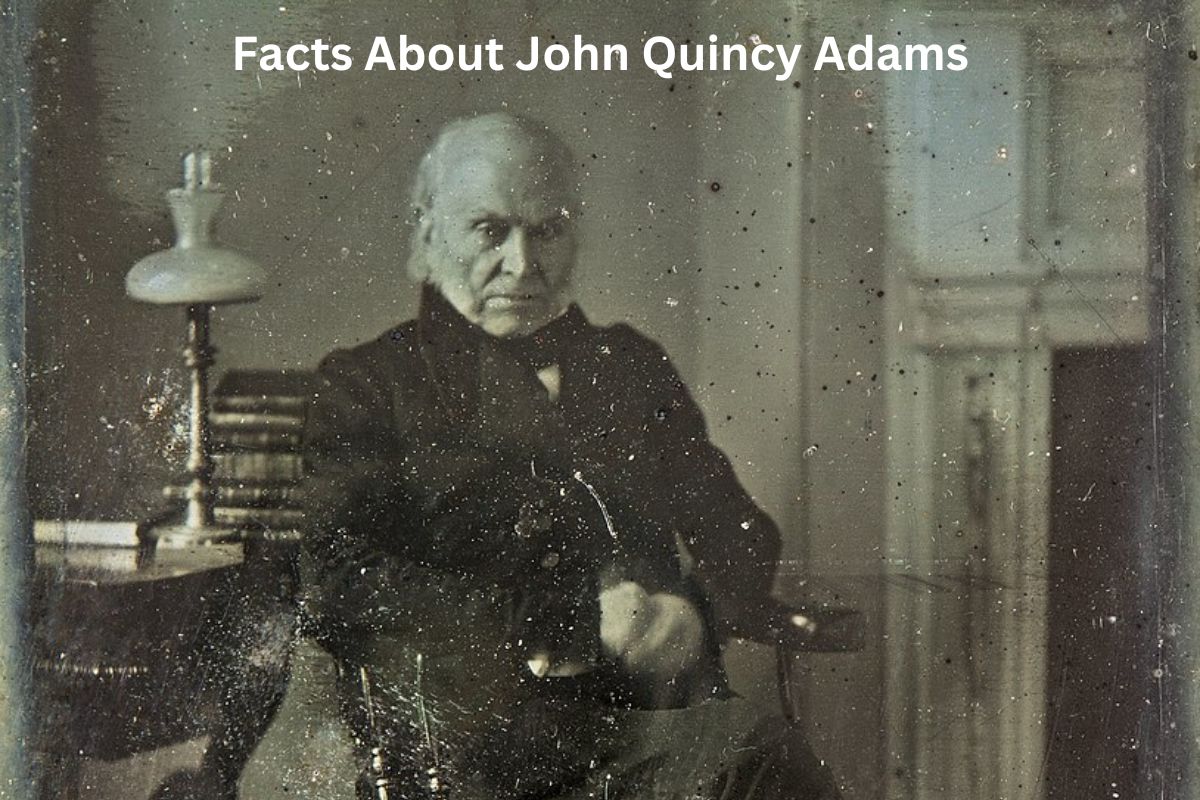John Quincy Adams, born in 1767, was a prominent American statesman and diplomat. He served as the sixth President of the United States and played a vital role in diplomatic negotiations, including the Treaty of Ghent.
Despite facing controversy during his presidency and allegations of a “corrupt bargain,” Adams remained committed to causes like abolitionism.
He continued his public service in the U.S. House of Representatives and passed away in the Capitol Building in 1848, leaving a legacy of principled leadership.
John Quincy Adams Facts
1. Born on July 11, 1767, in Braintree, Massachusetts
John Quincy Adams was born on July 11, 1767, in Braintree, Massachusetts. His family had a rich history in American politics.
His father, John Adams, was a prominent Founding Father and the second President of the United States. His mother, Abigail Adams, was known for her intellect and strong support of women’s rights.
Also Read: Timeline of John Quincy Adams
Growing up in such a family, John Quincy Adams was exposed to politics and diplomacy from an early age, which greatly influenced his own career.

2. Multilingual, speaking English, French, Dutch, and German
John Quincy Adams was renowned for his remarkable linguistic skills. He had a talent for learning languages, and he became fluent in several of them. His proficiency in English, French, Dutch, and German proved to be invaluable throughout his diplomatic career.
His ability to converse and negotiate in multiple languages made him an effective diplomat and negotiator during his service abroad. This linguistic talent set him apart in the field of diplomacy and helped him build strong international relationships.
3. Started his diplomatic career at a young age
Adams’ diplomatic career began when he was just a teenager. In 1778, at the age of 14, he accompanied his father, John Adams, to France when his father was appointed as a diplomat to seek French support during the American Revolutionary War.
John Quincy Adams served as his father’s secretary during this mission. This early exposure to the world of international diplomacy set the stage for his future career.
Also Read: Abigail Adams Timeline
He went on to serve as a diplomatic secretary in the Netherlands and later as a diplomat in various European capitals, gaining valuable experience in foreign affairs long before he would become the President of the United States.
His early diplomatic assignments helped him develop the skills and expertise that would be crucial to his later diplomatic successes, such as his role in negotiating the Treaty of Ghent.
4. Played a key role in negotiating the Treaty of Ghent in 1814
John Quincy Adams played a significant role in negotiating the Treaty of Ghent in 1814. This treaty marked the end of the War of 1812 between the United States and Great Britain. Adams was appointed as one of the American commissioners tasked with negotiating the peace agreement.
Despite facing challenging negotiations and contentious issues, Adams and his fellow commissioners successfully negotiated the treaty, which was signed on December 24, 1814.
The Treaty of Ghent restored pre-war boundaries and established peaceful relations between the United States and Britain. Adams’ diplomatic skills and dedication to securing a favorable outcome contributed to the successful resolution of the conflict.

5. Helped formulate the Monroe Doctrine
As Secretary of State under President James Monroe, John Quincy Adams played a pivotal role in formulating the Monroe Doctrine, a significant policy statement in U.S. foreign relations.
The Monroe Doctrine, articulated in Monroe’s annual message to Congress in 1823, declared that European powers should not interfere in the affairs of independent nations in the Western Hemisphere. It also stated that any attempt at colonization or intervention in the Americas would be considered a threat to the peace and safety of the United States.
Adams was instrumental in shaping the doctrine’s principles and objectives. The Monroe Doctrine had a profound impact on U.S. foreign policy and helped solidify the nation’s influence in the Western Hemisphere.
6. Elected as the sixth President of the United States in 1824
In the election of 1824, John Quincy Adams ran for the presidency as a Democratic-Republican candidate. This election was highly contentious and is sometimes referred to as the “Corrupt Bargain” election.
Adams did not receive a majority of the popular vote, and none of the four candidates running for president secured an electoral majority. As a result, the election was decided by the House of Representatives, where Adams emerged as the winner.
Some of his opponents, notably Andrew Jackson, accused Adams of making a political deal with Henry Clay, who was the Speaker of the House at the time and a candidate in the election.
Adams appointed Clay as his Secretary of State, which fueled suspicions of a backroom deal. While allegations of impropriety persisted, Adams became the sixth President of the United States, serving from 1825 to 1829.
7. Advocated for the abolition of slavery
John Quincy Adams was a staunch advocate for the abolition of slavery. His commitment to this cause was evident throughout his political career, both as a member of Congress and as a private citizen.
While serving in the U.S. House of Representatives after his presidency, Adams consistently spoke out against the institution of slavery. He was a prominent opponent of the “gag rule,” a House rule that prevented the discussion of anti-slavery petitions.
Adams fought to have these petitions heard and debated, asserting the rights of American citizens to express their concerns about slavery. His principled stance on this issue earned him the nickname “Old Man Eloquent” and cemented his legacy as a prominent abolitionist.
8. Faced allegations of a “corrupt bargain” during his presidency
John Quincy Adams’ presidency was marked by controversy due to allegations of a “corrupt bargain.” After winning the presidency in the House of Representatives in 1824, Adams appointed Henry Clay as his Secretary of State.
This appointment raised suspicions of a political deal, as Clay had been one of the other candidates in the election. Adams and Clay both denied any wrongdoing, but their political opponents, particularly supporters of Andrew Jackson, alleged that a bargain had been struck to secure Adams’ victory.
While there is no conclusive evidence of corruption, the controversy cast a shadow over Adams’ presidency and contributed to his challenges in gaining popular support during his time in office.

9. Served only one term as President, losing to Andrew Jackson in 1828
John Quincy Adams served only one term as President of the United States, from 1825 to 1829. His presidency was marked by political divisions and opposition from supporters of Andrew Jackson, who saw Adams as having won the presidency through questionable means.
Adams faced difficulties in advancing his agenda in Congress and struggled to build a broad political coalition.
As a result, he was defeated in his bid for re-election in 1828, losing to Andrew Jackson in a landslide. Despite his accomplishments and contributions to American diplomacy and politics, his presidency remains one of the less celebrated in American history.
10. Elected to the U.S. House of Representatives after his presidency
Following his presidency, John Quincy Adams embarked on a remarkable post-presidential career by winning election to the U.S. House of Representatives from Massachusetts.
He served as a member of the House from 1831 until his death in 1848. During his time in Congress, he continued to be a prominent advocate for various causes, including abolition, civil liberties, and opposition to the expansion of slavery into newly acquired territories.
His service in the House made him the only former U.S. President to hold a congressional seat, and he remained a respected and influential figure in American politics until his passing. His dedication to public service and his enduring commitment to his principles left a lasting legacy in American history.
11. Negotiated the Adams-Onís Treaty with Spain in 1819
As Secretary of State under President James Monroe, John Quincy Adams negotiated the Adams-Onís Treaty with Spain in 1819. This treaty, also known as the Transcontinental Treaty, had significant implications for the United States.
It settled a longstanding border dispute between the United States and Spanish Florida. Under the terms of the treaty, Spain ceded Florida to the United States, and the boundary between Spanish territory and the United States was established.
This treaty was essential for American expansion and security in the South, as it removed a potential source of conflict along the southern border. The Adams-Onís Treaty demonstrated Adams’ diplomatic skill and contributed to the territorial growth of the United States.
12. Taught at Harvard College as a professor of rhetoric and oratory
After his various diplomatic assignments and before his presidency, John Quincy Adams took on a role as a professor. He returned to his alma mater, Harvard College, in 1806 as the Boylston Professor of Rhetoric and Oratory.
This appointment was significant because it marked the establishment of the first-ever professorship in rhetoric and oratory at Harvard. In this role, Adams taught and influenced the next generation of American leaders, emphasizing the importance of effective communication and persuasive public speaking.
His tenure as a professor at Harvard was relatively brief but underscored his commitment to education and his belief in the power of effective oratory in shaping political discourse.
13. Died in the Capitol Building on February 23, 1848, making him the only President to die in the nation’s capital
John Quincy Adams holds the unique distinction of being the only U.S. President to die in the Capitol Building in Washington, D.C. On February 21, 1848, while he was serving as a member of the U.S. House of Representatives, Adams suffered a stroke on the floor of the House.
Despite efforts to save him, he passed away two days later on February 23, 1848, in the Speaker’s Room of the Capitol.
This extraordinary event is a testament to his enduring dedication to public service. His death in the Capitol, where he had served for many years, was a fitting end to a lifetime of contributions to the United States in various roles, from diplomat to President to Congressman.
